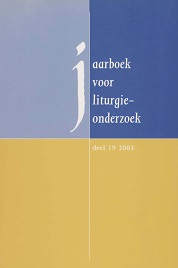Meditatie en subjectieve betekenisgeving. Meditatie als rituele vorm binnen nieuwe christelijke spiritualiteit
Abstract
Present-day ritual forms inside as well as outside church contexts are characterized by an increasing emphasis on the production of subjective meaning and intense personal experiences. This is in particular the case in forms of new religiosity. These forms of rituality outside the churches are still relatively unknown territory for Ritual Studies, especially as far as Christian spirituality outside the churches is concerned, for example Christian spiritual centres. Christian spiritual centres operate as independent providers of spirituality, focusing on a market of individual religious seekers. Most Christian spiritual centres have a Roman-Catholic background and are often affiliated with a religious order or congregation. The respective religious traditions of spiritual centres have been reinterpreted in a relativistic and inclusive way, which leads to an ecumenical attitude in which there is room for the exploration of various worldviews and religious practices. Spiritual centres offer programs that are devoted to the development of individual spirituality and may include courses and meetings, surrounding themes such as mysticism, art and religion, dance and movement. Ritual forms, such as meditation, are often central in the activities of spiritual centres. Ritual forms are seen as goal-oriented techniques aimed at personal transformation and experience. The case in this paper is a meditation group at the Ignatiushuis in Amsterdam, a spiritual centre founded by Jesuits. This weekly meditation meeting comprises fifteen regular members, most of them women between 55 and 70. Six of them take turns in leading the meditations. Most participants are (ex-)Roman-Catholics. Originating in ‘Ignatian meditation’, a reflexive method of meditation is used in which a text is the central object of meditation. Besides text meditation, a period of fifteen to twenty minutes of silence is part of the meeting. Although meditation meetings have certain themes linked to a certain text, a collective construction of meaning is virtually absent in the meetings. Participants rather shape their own meanings using the words and symbols from the meditation. Others, in particular those who feel uncomfortable with religious symbols, find the silent period most important. Thus, in this case meditation forms a hermeneutic space where participants can relate symbols and silence to personal reflection and experience. In this respect, it is the form of meditation rather than its verbal content that is important. This means that meditation as a ritual form enables people to construct personal meaning, regardless of a collectively shared symbolic framework.


